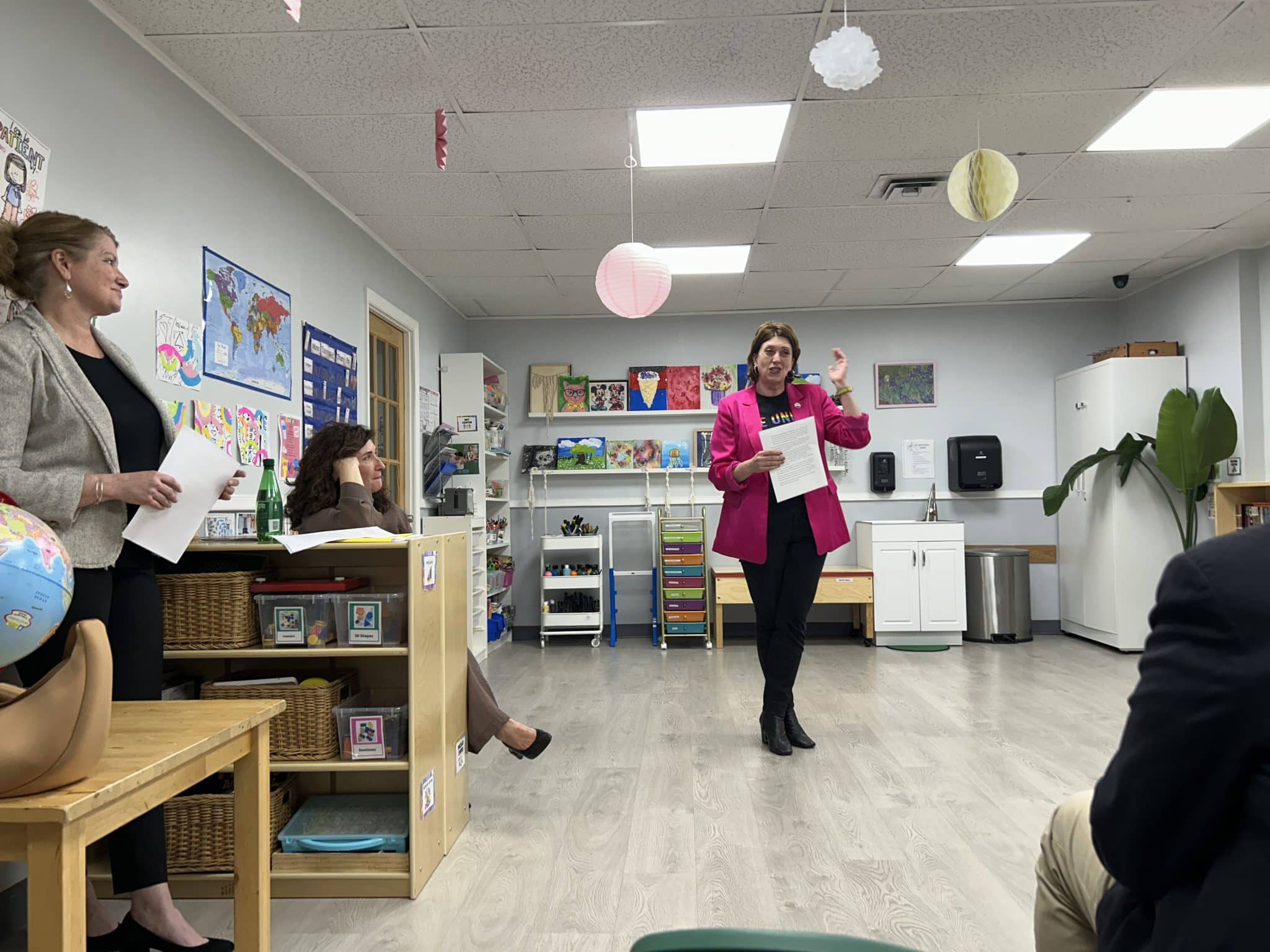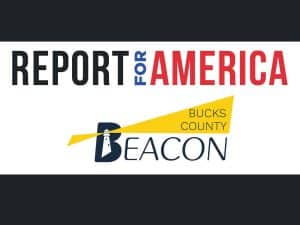Increasing staffing gaps and underfunding of child care services may pose a significant threat to Pennsylvania’s children.
This was the message representatives from the Lower Bucks County Chamber of Commerce, United Way of Bucks County, Children First, and state government were trying to get across Thursday afternoon at a press conference at Baby Genius Daycare in Langhorne. These advocates spoke about child care staffing shortages, a lack of child care services for low-income households, and the future economic cost of underinvestment in child care.
Start Strong PA conducted a statewide childcare survey in September 2024 that included statistics on individual counties. With respondents from 43 child care programs in Bucks County, 79 percent of people reported teacher shortages, 88 percent reported teacher recruitment challenges, 63 percent reported teacher retainment challenges, and there were 91 unfilled staff positions. Start Strong PA estimates that, countywide, 977 additional children could be served if these programs were fully staffed.
Victoria Yesypenko, the owner of Baby Genius Daycare, is originally from Ukraine where she used to work in a public school, and where her mother in law ran a daycare.
“It just so happened that [at this daycare], we are like a family. But I know we struggled for many, many years to find employees,” Yesypenko said. “I cannot understand why the United States is so strong, we have a lot of possibilities, we have a lot of money – why do we not recognize that daycare and childcare is a very, very important part of the economy in the future?”
Those most at risk of losing child care are households below the ALICE threshold, meaning they earn more than the Federal Poverty Level, which excludes them from programs like SNAP, WIC, and TANF. Yet, they earn less than the basic cost of living in the county. 25 percent of households in the county fall under the ALICE category.
In a 2023 report conducted by Start Strong PA, early childhood teachers earned an estimated $25,844 per year. Yet, a single adult in Bucks County needs more than $38,000 a year to survive according to Marissa Christie, president and CEO of United Way of Bucks County.
“We’re assuming in this scenario they don’t have student loans. We’re assuming they don’t have debt. We’re also assuming that they can get the cheapest apartment that is available to them and the lowest cost of everything, and it’s still $38,000 a year,” Christie said.
United Way of Bucks County supports ALICE households by providing financial and housing assistance, along with emergency assistance. However, Christie said she thinks charity cannot fight this issue alone.
“We’ve got to figure out some policy solutions, and we have to keep beating the drum,” Christie said. “We’ve got to pass a budget that reflects the economic imperative and the value of child care.”
United for ALICE, a movement grown out of United Way, features a map on its website showing ALICE households across each state. In Bucks County, Bensalem, Bristol, and Levittown have a disproportionate amount of ALICE households.
READ: Pennsylvania Must Increase Access to High-Quality Early Childhood Education
Speaking to the Beacon, Christie said that childcare has become more challenging in a post-COVID world. Her daughter’s pre-K could not retain staff because wages had risen in fields such as retail and hospitality, including large corporations like Target and Amazon. Yet early education wages remained stagnant.
“If a childcare provider or pre-K site can pay $10, $11, $12 an hour, but a fast food restaurant can pay $15, $18 an hour, where’s the incentive to stay and do what I consider to be very challenging work?” Christie asked.
As for solutions, Christie suggested enhanced child tax credits and an earned income tax credit at the state level. She also believes providers should be able to comfortably increase salaries so they can retain staff.
“When I think about the investments that are required in access to high-quality early childhood education, it’s about the child’s future, it’s about the parents’ present, and it’s about our entire community being able to thrive,” Christie said.
Shirlee Howe of Children First cited Governor Shapiro’s 2025-2026 budget proposal, which would give employees working in licensed child care providers a $1,000 annual boost in salary. Howe said this would be a 3 percent increase in their incomes.
“When I think about the investments that are required in access to high-quality early childhood education, it’s about the child’s future, it’s about the parents’ present, and it’s about our entire community being able to thrive.” – Marissa Christie, president and CEO of United Way of Bucks County
Republican State Senator Frank Farry said the state legislature is generally supportive of improving child care services, looking to child tax credits, but the situation remains uncertain. The House of Representatives recently passed the federal budget bill which cuts a significant amount of federal funding from essential services.
“We are not in great financial shape, the Commonwealth, I don’t know with what DC just did – I don’t know what that final product’s going to end up looking like in terms of impacting us financially in other parts of our budget,” Farry said.
William Ferrera, president and CEO of the Lower Bucks County Chamber of Commerce, noted that the lack of investment in child care also affects the business side of things. A study by ReadyNation uncovered that gaps in child care cost working parents, employers, and taxpayers $6.65 billion annually in lost earnings in PA.
“This doesn’t just harm the individual, it harms the businesses that rely on those workers, and it harms the broader economy of Pennsylvania,” Ferrera said.
And while the “demand” side of funding child care has partly been addressed, Ferrera said, the “supply side” has not. Public school teachers have a union, a pension, and substantial benefits, as opposed to child care employees who do not.
“While tax credits are an important step forward, it only addresses part of the crisis,” Ferrera said. “Are you going to go to Neshaminy High School or a preschool? Are you going for benefits and most importantly your pension, or are you going to come here?”







